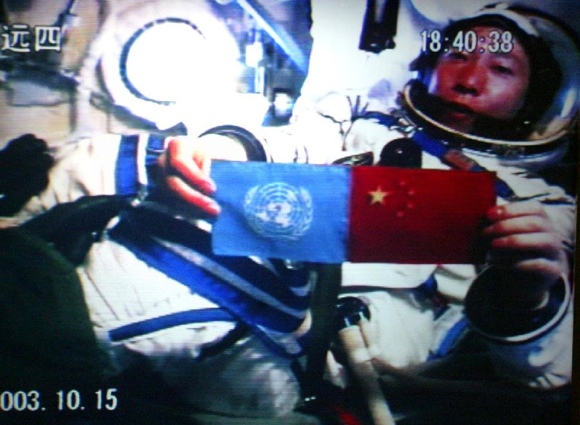Chinese Astronaut Yang Liwei aboard his Shenzhou V spacecraft during China’s first human space flight in October 2003. Image captured from a Chinese Central Television (CCTV) broadcast.
In a March 28 essay in The Diplomat, Scott Pace, a leading U.S. space policy expert, argues the United States should take proactive steps “to shape the international environment for the space activities that our economy and security depend on.” One important step he suggests is to focus on Asia.
His approach appears in part to be aimed at countering Chinese influence:
“If China is able to offer pragmatic opportunities for space cooperation on its own space station or as part of efforts to send humans to the Moon, other countries will likely see it attractive to forge closer relationships with China. A shift in international space influence away from the United States and toward China would have the potential to impact a wide range of U.S. national security and foreign policy interests in space.”
As a result, he recommends the U.S. strengthen ties with allies in the region:
“A primary strategic task for the United States should be to develop and implement a national security space strategy for the Asia-Pacific region. In particular, to build on existing alliance relationship such as with Japan, Australia, and South Korea to include dual-use space technologies.”
A “pivot” in U.S. space policy aimed at countering Chinese influence would be consistent with the Obama administration’s strategic shift of U.S. economic and defense priorities toward Asia. But it also risks extending regional tensions exacerbated by the “unnecessary and counterproductive” aspects of Obama’s pivot to Asia into a vitally important global commons.
Instead of isolating China in space with the aid of a reluctant collection of Asian partners who all wish to maintain constructive relations with the world’s second largest economy, U.S. interests might be better served by an inclusive national space strategy that embraces cooperation with China. Other U.S. space policy experts note that many U.S. partners, including the European Space Agency (ESA) and Canada, are already urging the United States to pursue cooperation and drop its opposition to Chinese to participation in the International Space Station (ISS). They argue a U.S. invitation to China is a low-risk, cost-effective means for the United States “to retain its leadership position in the current HSF [Human Space Flight] program” and establish itself as the leading partner in a follow-on program after the ISS is retired.
“A partnership with China could be developed along the same lines as was done with integrating the Russian space program into the ISS partnership. Using this model, no military-sensitive technology would be transferred. China’s economy would allow for it to fully fund its own efforts. Thus there would be little increased expense to the United States for developing this advantageous relationship.“
More importantly, the image of Chinese astronauts working together with global partners, including the United States, would shift the geostrategic import of Chinese achievements in space away from national ambitions towards the more politically constructive Chinese goal of establishing China as an equal member of the international community of space-faring nations. Organizing a U.S.-led coalition of space-faring Asian nations that excludes China would have the opposite effect, and risks igniting a new and counterproductive space race pitting China against its neighbors.
Dr. Pace appears open to a more inclusive approach that should “serve the full range of U.S. interests is in the Asia-Pacific region, beginning but not limited to our traditional friends and allies such as Japan and Australia.” The U.S. and its allies have a strong interest in constructive relations with China, which would be better served by cooperation than by competition in space.

